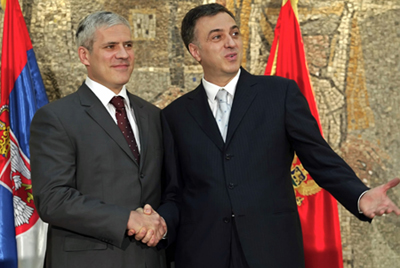Center
Montenegro's independence accepted
(AP)
Updated: 2006-05-28 10:09
 |
Large Medium Small |
PODGORICA, Serbia-Montenegro -- Serbian President Boris Tadic assured Montenegrin leaders on Saturday that Belgrade will accept the tiny Balkan republic's separation from Serbia and pledged to build strong relations between the two sovereign states.
 Montenegro's President Filip Vujanovic (R) welcomes his Serbian counterpart Boris Tadic during a meeting in Podgorica May 27, 2006. Tadic arrived in Montenegro on a first official visit by a Serb leader after the tiny Balkan republic opted for independence.[Reuters] |
"Serbia will respect the will and the decision of the people of Montenegro," Tadic told reporters in Podgorica, the Montenegrin capital, after talks with Montenegrin officials.
Tadic visited Montenegro Saturday following the independence referendum in the tiny Adriatic republic on May 21.
The republic's EU-appointed referendum commission on Saturday rejected the pro-Serb bloc's complaints against the results as unfounded.
The development brings the results closer to being certified and means Montenegro's parliament may be able to proclaim independence as early as next week.
Montenegro's Prime Minister Milo Djukanovic has accused Serbia of meddling in Montenegrin affairs by encouraging those who were against independence to stand firm in rejecting the outcome of the referendum.
Tadic met with senior officials in the republic's government, including Djukanovic, who was a key leader of the pro-independence drive.
Earlier in the week, Tadic had recognized the outcome of Montenegro's referendum. Before his trip, he said that he hoped it would "contribute to stabilization of political situation ... and strengthen relations" between the once close allies.
"We all have to think with very clear heads where our common interests now lie and start building the foundations of our future relations in accord with the new reality" in Montenegro, Tadic said.
Montenegrin President Filip Vujanovic said after talks with Tadic that "there are no two states on this planet that ought to have better ties than Serbia and Montenegro."
Serbia-Montenegro was the last union between republics of the former Yugoslavia after the federation collapsed in a series of wars in the 1990s.
Tensions have remained high since the vote. Montenegro's 620,000 people remain deeply divided over the independence issue. The preliminary official count showed 55.5 percent voted in favor of independence _ just half a percentage point, or 2,090 votes, over the 55-percent threshold needed to validate secession under EU guidelines.
Montenegro's pro-Serb opposition lodged 240 formal complaints against the voting process, claiming irregularities and demanding an annulment at dozens of polling stations.
But Referendum Commission official Zdravko Gvozdenovic said the complaints were rejected Saturday, leaving the unionists with the option of appealing to Montenegro's constitutional court. It was not immediately clear whether they planned such a move.
Unionist leader Andrija Mandic, of the Montenegrin Liberal Serb Party, said his bloc would call street protests if the referendum commission throws out all the opposition's complaints on the vote.
The EU, the U.S. and international observers have said the vote was free and fair.